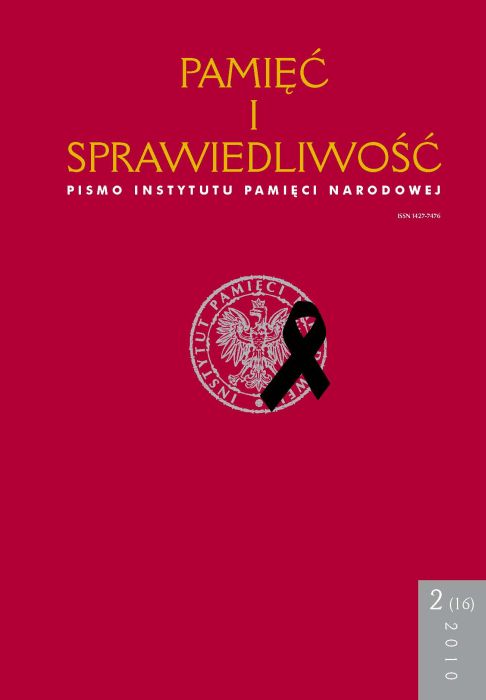Zachód ratuje generała?! Paradoksy zachodniej dyplomacji w czasie przemian w Polsce (czerwiec–lipiec 1989 roku)
Pamięć i Sprawiedliwość, Tom 16 Nr 2 (2010), strony: 193-210
Data publikacji: 2010-12-30
Abstrakt
From 1989 onwards, political situation in Poland started changing kaleidoscopically; for this reason, western diplomacy could not fully keep up with reassessing its strategies aimed at this part of Europe. That situation became clearly visible especially during the full of paradoxes period between the overwhelming victory of the “Solidarity” movement in first round of the parity elections on 4 June 1989 and swearing Gen. Wojciech Jaruzelski in as the PRL’s President on 19 July 1989. The West, and mostly the USA, were amazed with changing political circumstances in Poland, therefore – in a surprising way – they started indirectly supporting Gen. Jaruzelski in his quest for presidency. Simultaneously, during the entire decade of 1980s, they tended to favour and lobby “Solidarity” movement in order to weaken significant Soviet influence in the Eastern Bloc.
General’s election as President was to be treated as a guarantee of adherence to the terms of (the) Round Table Agreement and of preventing Polish political situation from excessive radicalization which could lead to an outbreak of acute crisis in the country and would provoke a negative reaction of conservative circles in
Moscow. In view of what could have happened, President George Bush during his official visit to Poland in July, urged General Jaruzelski to stand for presidential elections, whereas U.S. Ambassador John R. Davis explained to the “Solidarity”
leaderships how to discreetly support General in the election taking place during the National Assembly session. Moreover, somewhat earlier, French President François Mitterand, during his lecture in Cracow, exhorted the students “not to throw the socialism out of a window”.
That astonishing political vote-face of the West (and of part of the “Solidarity” members) was only an episode in a chequered history of Polish political transformation process. Western politicians’ hitherto concerns about current World’s situation decreased within progressive dissolution of the Eastern Block. They gradually started changing – into the proper one – their attitude towards communist regimes and towards political opposition taking over power in the country.
Inne teksty tego samego autora
- Patryk Pleskot, [konferencje] O zaufaniu i jego braku. Międzynarodowa konferencja naukowa „Trust and distrust in the Eastern Bloc and the Soviet Union, 1956–1991”, University College London, 4–5 VII 2013 r. , Pamięć i Sprawiedliwość: Tom 23 Nr 1 (2014)
- Stanisław Bereś, Jerzy Brukwicki, Andrzej Chojnowski, Emilian Kamiński, Marek Nowakowski, Zygmunt Staszczyk, Sebastian Ligarski, Patryk Pleskot, Twórcy o twórcach w PRL , Pamięć i Sprawiedliwość: Tom 24 Nr 2 (2014)
- Patryk Pleskot, Od Wolnej Europy do wolnej Europy. Sprawozdanie z konferencji „From Free Europe to Free Poland. Free Europe Committee in the Cold War”, Gdańsk, 5–6 września 2014 roku , Pamięć i Sprawiedliwość: Tom 24 Nr 2 (2014)
- Patryk Pleskot, Kurtyna żelazna czy nylonowa? Sprawozdanie z konferencji „Across the »Nylon Curtain«: Cold War Cooperation and Trans-systemic Exchanges”, Hamburg 29 IX – 1 X 2022 roku , Pamięć i Sprawiedliwość: Tom 40 Nr 2 (2022)
- Patryk Pleskot, Bonn – Warszawa – „Solidarność”. Dyplomacja RFN wobec PRL i „Solidarności” (styczeń–wrzesień 1989 roku) , Pamięć i Sprawiedliwość: Tom 18 Nr 2 (2011)
- Patryk Pleskot, Europa na walizkach. Międzynarodowa konfernecja "Totalitarianism, Deportation and Emigration", Viljandi, 28-30 czerwca 2016 , Pamięć i Sprawiedliwość: Tom 27 Nr 1 (2016)
- Patryk Pleskot, Polacy w czerwcu 1980 r. – raport brytyjskiego attaché wojskowego , Pamięć i Sprawiedliwość: Tom 21 Nr 1 (2013)
- Patryk Pleskot, Historia, sprawiedliwość i polityka. Międzynarodowe seminarium z cyklu „Histoire de la mémoire” (Tunis, 8 IV 2017 r.). Spostrzeżenia i impresje , Pamięć i Sprawiedliwość: Tom 29 Nr 1 (2017)
- Patryk Pleskot, Zaoczne wyroki śmierci w stanie wojennym. Casus Romualda Spasowskiego i Zdzisława Rurarza , Pamięć i Sprawiedliwość: Tom 43 Nr 1 (2024)
- Patryk Pleskot, Skąd przyszliśmy i dokąd zmierzamy. Konferencja „Quo vadis Europo?”, Oświęcim, 6–7 marca 2017 roku , Pamięć i Sprawiedliwość: Tom 30 Nr 2 (2017)
 Język Polski
Język Polski
 English
English
 Deutsch
Deutsch
 Français (France)
Français (France)
 Italiano
Italiano
 Русский
Русский


 PDF
PDF
